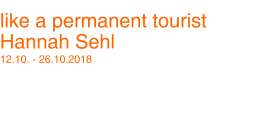
Äußere Vorzeichen, innere Ahnungen // Philip Kanwischer | IMAGINARY DISPLAY(s) (Talk/Screening) // Marie-France Rafael, Kalas Liebfried |
Habitat // Phillip Poppek | great meeting YOU // Sarah Veith |
Komplize List // Jacob Ott, Johannes Willi with workshop by Fritz Laszlo Weber | ECHO (Screening) // Katharina Wittmann |
BLACKBOX / IDEALcollection // Gregor Peschko | A RETROSPECTIVE // Samuel Bich |
CK-OFFSPACE: OPEN CALL // Christian Kölbl | like a permanent tourist // Hannah Sehl |
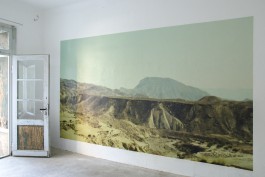
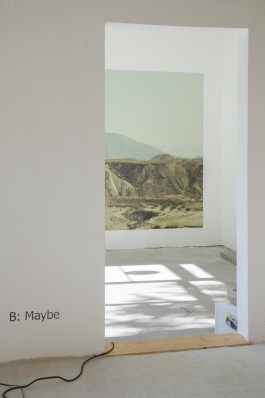
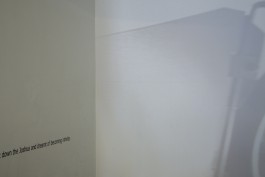
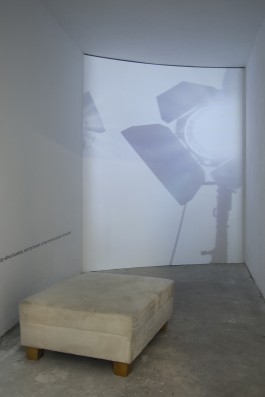
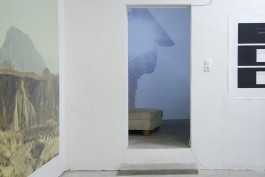
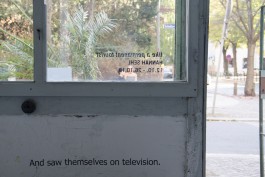
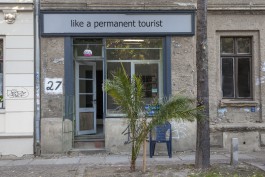
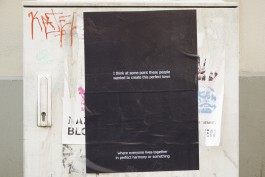
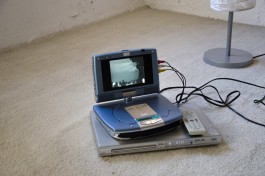
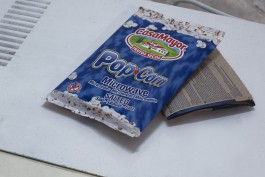
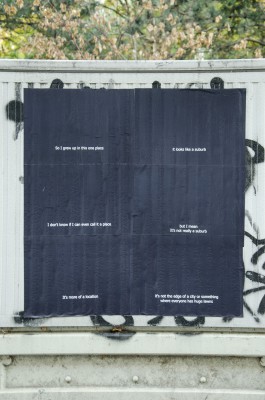
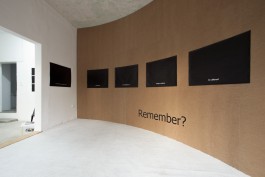
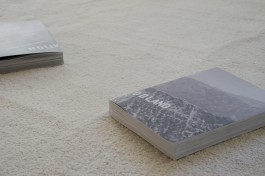
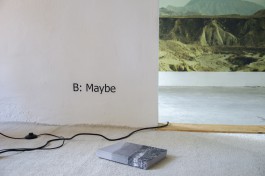
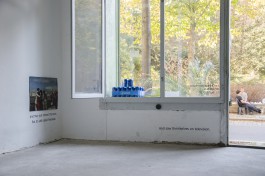
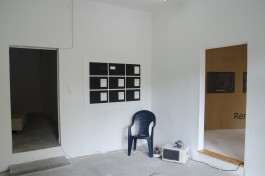
Home changes. Illusions change. People change. Time moves on.
(The Lure of the Local (1997), Lucy R. Lippard)
You see? Your love is circular. There's nothing like it. It makes us forget how to change. Your senseless complexity, your glorious gentrification nightmares. I love how you always make us go back to the starting points. We keep losing everything. [...] Yes, I wanted to tell you that the most ridiculously pathetic scenes are to be taken seriously.
(Reena Spaulings (2005), Bernadette Corporation)
It's like a cycle or something.
(Garden State (2006), Zach Braff)
Vielleicht.
Es ist die Rede von einem Ort, der kreiert wurde und jetzt ist. Ein Buch beginnt wie es endet, die Wände der Räume sind abgerundet. Links die Wüste, hinten eine um sich selbst kreisende Kamera. Alle Lichter sind auf sie gerichtet, während I versucht you davon zu überzeugen, dass I sich verändert hat. Erinnert ihr euch?
Zwischen Geschichten der Entfremdungen und unbestimmten Sehnsüchten nach einem Zuhause, wird das Konzept der multizentrischen Gesellschaft zu einer Möglichkeit die wechselseitige Beziehung der Beiden zu verstehen. Die Ausstellung mit dem Titel like a permanent tourist benutzt unterschiedliche Arten der Geschichtsschreibung und -erzählung, fragt nach dem Wen oder Was vor und hinter den Geschichten, stellt dabei Fragen nach einem Wo, das sich nur manchmal an einem konkreten Ort festhält, um sich dann wieder im Kontinuum des Erzählens aufzulösen. Neben urbanen Mythenerzählungen, Filmausschnitten, Zitaten von Geographen und weiteren gesammelten Bild- und Textfragmenten, wird ein Ich immer wieder in die Arbeit eingewoben. Denn ge- und erlebte Erfahrungen sind zentrales Element für den Ort, der hier Subjekt und Objekt zugleich ist.
//
Maybe.
There is a story about a place that was created but now is. A book that starts as it ends, the walls are curved. A desert to the left, an endless camera pan at the back. All lights on her, while I is trying to convince you that I has changed. Remember?
Between a history of alienated displacement from and longing for home, the possibility of a multicentered society understands the reciprocal relationship between the two. The exhibition like a permanent tourist uses strategies of (hi)storytelling, asks about a whom or what in front and behind the stories told and asks questions about a where, that only sometimes gets fixed onto a geographical location, only to soon dissolve back into the continuity of the narrative. Next to Urban Myths, Film Excerpts, Quotes by Geographers, an I is woven into the work, as lived experience is a central element within the subject of place, here simultaneously acting as subject and object.
text: Hannah Sehl
like a permanent tourist
Hannah Sehl
12.10. - 26.10.18
















Home changes. Illusions change. People change. Time moves on.
(The Lure of the Local (1997), Lucy R. Lippard)
You see? Your love is circular. There's nothing like it. It makes us forget how to change. Your senseless complexity, your glorious gentrification nightmares. I love how you always make us go back to the starting points. We keep losing everything. [...] Yes, I wanted to tell you that the most ridiculously pathetic scenes are to be taken seriously.
(Reena Spaulings (2005), Bernadette Corporation)
It's like a cycle or something.
(Garden State (2006), Zach Braff)
Vielleicht.
Es ist die Rede von einem Ort, der kreiert wurde und jetzt ist. Ein Buch beginnt wie es endet, die Wände der Räume sind abgerundet. Links die Wüste, hinten eine um sich selbst kreisende Kamera. Alle Lichter sind auf sie gerichtet, während I versucht you davon zu überzeugen, dass I sich verändert hat. Erinnert ihr euch?
Zwischen Geschichten der Entfremdungen und unbestimmten Sehnsüchten nach einem Zuhause, wird das Konzept der multizentrischen Gesellschaft zu einer Möglichkeit die wechselseitige Beziehung der Beiden zu verstehen. Die Ausstellung mit dem Titel like a permanent tourist benutzt unterschiedliche Arten der Geschichtsschreibung und -erzählung, fragt nach dem Wen oder Was vor und hinter den Geschichten, stellt dabei Fragen nach einem Wo, das sich nur manchmal an einem konkreten Ort festhält, um sich dann wieder im Kontinuum des Erzählens aufzulösen. Neben urbanen Mythenerzählungen, Filmausschnitten, Zitaten von Geographen und weiteren gesammelten Bild- und Textfragmenten, wird ein Ich immer wieder in die Arbeit eingewoben. Denn ge- und erlebte Erfahrungen sind zentrales Element für den Ort, der hier Subjekt und Objekt zugleich ist.
//
Maybe.
There is a story about a place that was created but now is. A book that starts as it ends, the walls are curved. A desert to the left, an endless camera pan at the back. All lights on her, while I is trying to convince you that I has changed. Remember?
Between a history of alienated displacement from and longing for home, the possibility of a multicentered society understands the reciprocal relationship between the two. The exhibition like a permanent tourist uses strategies of (hi)storytelling, asks about a whom or what in front and behind the stories told and asks questions about a where, that only sometimes gets fixed onto a geographical location, only to soon dissolve back into the continuity of the narrative. Next to Urban Myths, Film Excerpts, Quotes by Geographers, an I is woven into the work, as lived experience is a central element within the subject of place, here simultaneously acting as subject and object.
text: Hannah Sehl